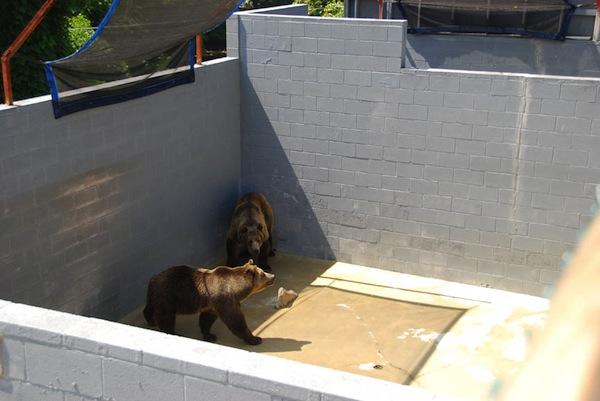
Bears kept in cement pens at the Cherokee Bear Zoo, which is being sued by tribal elders for inhumane conditions, including inadequate shelter and lack appropriate shade.
By Vincent Schilling, ICTMN
The grisly scene could have been straight out of a horror movie. Bears kept in deep concrete pits devoid of soil, grass or any other environmental essentials. Distressed bears pacing in circles, their teeth broken from attempts to chew through the metal cages. Months-old baby bears, which otherwise would stay with their mothers for well over a year, instead separated and put into bird cages to entertain the crowds, forced to live on dog kibble and Hawaiian Punch.
This was a bear’s life at the Cherokee Bear Park, and it is the sight that traumatized Eastern Band of Cherokee Tribal Elders Amy Walker and Peggy Hill, they say. The two are suing the Cherokee Bear Zoo on the Cherokee Reservation, citing consistent and repeated violations of the federal Endangered Species Act. The suit was filed on December 3 in U.S. District Court in Bryson City, North Carolina.
The park is one of three on the Cherokee reservation, one of which was shut down earlier this year by the federal government for similar treatment of the animals. Though authorities closed Chief Saunooke Bear Park last January, according to the Huffington Post, Cherokee Bear Park and a third one, Santa’s Land, remain open.
“It’s shameful that the Cherokee Bear Zoo is still displaying intelligent, sensitive bears in tiny concrete pits,” said Walker. “It’s obvious to anyone who sees them that these bears are suffering, and they will continue to suffer every day until they are sent to a sanctuary where they’ll finally receive the care they need.”
In the lawsuit, which names Barry and Collette Coggins of the Cherokee Bear Zoo as plaintiffs, the Davis and Whitlock firm in Asheville, North Carolina cite the Cherokee Bear Zoo as having “barren and archaic concrete pits which significantly disrupt and impair the grizzly bears’ normal and essential behavioral patterns, resulting in inhumane living conditions.”
According to Cheryl Ward, who was called upon as a consultant on the case for Walker and Hill and is a leader of the Coalition for Cherokee Bears, cries to tribal officials have gone unheard for some time regarding the deplorable conditions of these parks.
“More than EIGHT months ago the tribal elders, along with other enrolled tribal members, urged the Tribal Council and Principle Chief Hicks to take action on behalf of these bears,” said Ward in an e-mail to ICTMN.
“Tribal officials have had ample opportunity to take meaningful action to help these suffering animals and they have failed, but the elders are not giving up,” she wrote. “The bears are entitled to the protections they are afforded under federal law and they deserve to be sent to a reputable sanctuary where they can finally be bears.”
Ward also expressed gratitude that Chief Saunooke Bear Park, which had housed 11 bears in conditions similar to those at Cherokee Bear Park, was closed down and that in June the bears were relocated to a 50-acre animal sanctuary in Texas. The USDA had suspended the park owner’s license and fined them $20,000 for inhumane living conditions.
In May 2010, enrolled members of the Eastern Band of Cherokee along with Delcianna Winders, director of captive animal law enforcement for the animal-rights group People for the Ethical Treatment of Animals (PETA), had met with the USDA to file complaints and submit a comprehensive report on the three bear parks, all in Cherokee, South Carolina. The report, Status of Bear Welfare, was authored by four experts on bear habitats and care, including Debi Zimmerman, an animal behaviorist with several decades of experience in animal husbandry.
About two months after the group’s meeting with the USDA, the federal agency traveled to the facility and issued a violation.
“The USDA confirmed that Chief Saunooke deprives the bears in its concrete pits of even their most basic needs, all the way down to proper food and shelter,” Winders said in a statement at the time.
“I just want people to be aware that these bears are being held in conditions that are like the 1950s—people in accredited facilities are not keeping bears like this in any way at all,” Winders told ICTMN on December 3. “The bears are being deprived of everything that is important to them.”
The scene immediately reminded Zimmerman of a horror movie, she told ICTMN. Speaking from her office in Ontario, Canada, Zimmerman said PETA had hired her to survey Chief Saunooke Bear Park and report on the conditions. When she walked into the facility, she said, Silence of the Lambs, in which a victim is held captive in a dark pit by a serial killer, leapt to mind.
“It is hard to shock me because I evaluate the conditions animals live in. But I have to say walking in and seeing this was a surprise,” Zimmerman told ICTMN. “The character in that movie was sensory-deprived, and it was a hideous situation. It is the same for these animals…. I cannot overstate how un-stimulating this was. Bears can’t live in a pit any more than that woman [character] could live healthfully in a pit. It was simply a bear in a pit—there’s nothing else.”
Zimmerman saw behaviors consistent with neglect, including pacing and head-swinging. Bears were also rubbing themselves raw, producing open and oozing sores. Young bear cubs paced frantically.
“Their pace showed the degree to which they were stressed,” Zimmerman said. “They are at a stage when their brains are developing quickly, and when you put a brain that needs complexity into a sensory-deprived environment, there is heightened stress and the need to get out of there.”
In October the animal-rights group People for the Ethical Treatment of Animals (PETA) filed a lawsuit against the USDA , claiming the agency had failed to protect bears that were suffering in the roadside zoos. The previous year, PETA had purchased billboards in the area calling the roadside zoos “prisons,” and PETA spokesperson Bob Barker had also spoken out against the enclosures.
Attorneys for the plaintiffs say the suit is unfounded. Mark Melrose of Melrose, Seago & Lay, who represents the Cherokee Zoo owners, said the owners will move to dismiss the case because the plaintiff’s complaint “lacks factual and legal basis.”
“The Cherokee Bear Zoo is closely regulated and monitored by federal agencies and state and local authorities and is in compliance with all existing regulations and laws and is operating lawfully,” Melrose told the Citizen Times.
Nevertheless, a petition against the Cherokee Bear Park has garnered well over 5,000 signatures from all over the world with its demand that the park be shut down. Over the past several years, many organizations have attempted to close down all three bear parks.
“The elders want ALL the roadside zoos shut down and the animals moved to reputable sanctuaries,” said Ward.
Previously Eastern Band Chief Michell Hicks released a statement saying he wanted to give private zoo owners the opportunity to create a wildlife preserve on the reservation.
The Cherokee Bear Zoo’s owners did not respond to ICTMN’s repeated requests for comment.
Read more at http://indiancountrytodaymedianetwork.com/2013/12/04/tribal-elders-sue-cherokee-bear-zoo-stop-animal-treatment-befitting-horror-movie-152557

